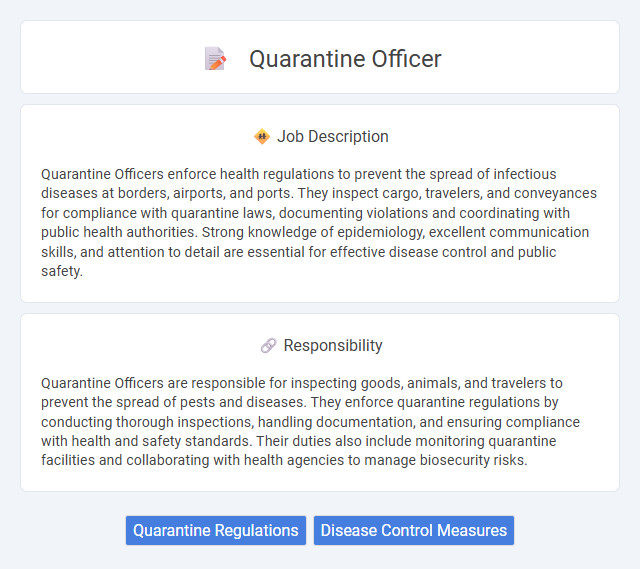
Quarantine Officers enforce health regulations to prevent the spread of infectious diseases at borders, airports, and ports. They inspect cargo, travelers, and conveyances for compliance with quarantine laws, documenting violations and coordinating with public health authorities. Strong knowledge of epidemiology, excellent communication skills, and attention to detail are essential for effective disease control and public safety.
Individuals with strong observational skills and the ability to remain calm under pressure are likely to be suitable for a Quarantine Officer role, as the job involves monitoring the health and safety conditions of people entering or leaving specific areas. Those who can handle stressful situations and enforce regulations with empathy may find this position fitting, given its focus on maintaining public health during quarantine periods. People with a tendency to be detail-oriented and patient might have a higher probability of succeeding in this role.
Qualification
Quarantine Officers typically require a degree in public health, biology, or a related field, along with specialized training in disease control and biosecurity measures. Proficiency in identifying and managing potential biohazards and invasive species is essential for ensuring public safety and compliance with regulatory standards. Strong analytical skills and experience with inspection protocols enhance the effectiveness of quarantine enforcement and risk management.
Responsibility
Quarantine Officers are responsible for inspecting goods, animals, and travelers to prevent the spread of pests and diseases. They enforce quarantine regulations by conducting thorough inspections, handling documentation, and ensuring compliance with health and safety standards. Their duties also include monitoring quarantine facilities and collaborating with health agencies to manage biosecurity risks.
Benefit
Quarantine Officer positions likely offer benefits such as comprehensive health insurance, paid leave, and retirement plans to support employees' well-being. Opportunities for professional development and training may be available, enhancing career advancement prospects. The role probably includes job stability due to its essential function in public health and safety.
Challenge
Quarantine Officer roles likely present significant challenges related to managing the health risks associated with infectious diseases. The job probably demands constant vigilance and quick decision-making to prevent the spread of illnesses, requiring strong attention to detail and resilience under pressure. It is probable that officers face unpredictable situations that test their ability to enforce regulations while maintaining public cooperation.
Career Advancement
Quarantine Officer roles offer significant career advancement opportunities through specialized training in biosecurity, epidemiology, and international health regulations. Progression often leads to senior positions such as Quarantine Supervisor or Biosecurity Manager, where professionals oversee compliance with quarantine laws and coordinate response strategies. Expertise gained in risk assessment and pathogen control enhances prospects for roles in public health policy development and global disease prevention initiatives.
Key Terms
Quarantine Regulations
Quarantine Officers enforce quarantine regulations to prevent the spread of infectious diseases, ensuring compliance with health protocols at ports of entry. They inspect cargo, luggage, and travelers to detect prohibited items and potential biohazards, applying strict guidelines established by health authorities. Monitoring quarantine zones and coordinating with public health agencies guarantees the containment of contagious threats, safeguarding public health and safety.
Disease Control Measures
Quarantine Officers play a critical role in enforcing disease control measures by monitoring and managing individuals or goods entering a region to prevent the spread of infectious diseases. They implement screening protocols, manage quarantine facilities, and collaborate with public health authorities to ensure compliance with regulations. Their work is essential in detecting and isolating potential health threats, thereby protecting public health and minimizing epidemic risks.
 kuljobs.com
kuljobs.com